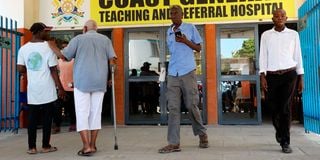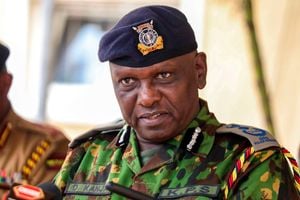Standoff as striking doctors rubbish mediation calls

The enterance to Coast General Teaching and Referral Hospital in Mombasa on March 14, 2024.
What you need to know:
- The doctors are demanding comprehensive medical insurance for the union members.
- The union also wants the government to allocate 15 per cent of its annual budget to Health.
Doctors have been directed to agree with the government on critical services they shall provide amid the strike so as not to endanger the life, personal safety or health of patients requiring essential services.
Employment and Labour Relations Court judge Byram Ongaya had given members of the Kenyan Medical Practitioners Pharmacists and Dentists Union (KMPDU), Health Cabinet Secretary Susan Nakhumicha, and her Labour counterpart Florence Bore until noon yesterday to come to an agreement and file a report in court today for directions.
“Hold a meeting with KMPDU officials to negotiate in good faith, the grievances outlined in the strike notice and also agree on minimum safety services the members of the union shall provide in the event the strike goes on,” Justice Ongaya said in his ruling yesterday.
The meeting is scheduled to take place at the Ministry of Labour offices.
“Pending the return date or further orders by the court, the union's officials and members shall continue to work without intimidation, harassment, victimisation or discrimination ... and with full prevailing contractual benefits,” the judge directed.
The Kenyatta National Hospital (KNH) on Wednesday filed a petition under a certificate of urgency seeking a suspension of the strike, terming it unlawful.
Through lawyer James Kounah, KNH further urged the court to direct the Ministry of Labour and Social Protection to appoint a conciliator to resolve and finalise a new collective bargaining agreement (CBA).
Mr Kuonah regretted that, despite the ongoing negotiations, the KMPDU had gone ahead and issued the strike notice on March 6 citing remuneration and contractual disputes as well as the promotion of consultants.
He said the strike will significantly disrupt healthcare services.
In an affidavit, Ms Jane Akunda, the senior human resources officer at KNH, said the strike had no regard for the fundamental human rights of patients, citing the right to life, right to the highest attainable standards of health, the right to healthcare services and the right to receive emergency medical treatment.
She added that the strike notice was premature as the negotiations were ongoing and a dispute has not yet been reported to the Ministry of Labour.
Justice Ongaya said the parties should agree on which minimum safety services shall be maintained as strictly necessary without rendering the strike ineffective. He added that the agreement should include the number of each cadre of union members and the respective duties to be performed.
At the same time, The KMPDU has maintained that the strike is on and that they will not be engaged in any mediation talks.
“Doctors are not in hospitals. We will not be intimidated. All we are asking for from the government is to allow us to strike in peace. We will not be part of the scheduled mediation meeting. We are not children to be tossed around,” KMPDU Secretary-General Davji Atellah said.
Dr Atellah lamented that, for years, doctors have been humiliated, intimidated and frustrated by the government, which “wants us to beg and kneel while asking for our rights”.
“We are not going to be part of that mediation meeting. Our lawyers will go if need be. We pleaded with them to talk to us before this strike but [they ignored us]. We are not relenting; if the strike is the language that they understand best, let's speak it,” Dr Atellah said.
Dr Atellah indicated that they have put all the measures in place to address the minimum safety services to Kenyans while the strike is on.
“How do you call a meeting to define the minimum services [that will be offered to patients]? This is already arranged. That meeting [with the Health and Labour ministers] is not for us; let them meet and decide how to pay us,” Dr Atellah said.
He continued: “Already, we have doctors on call to attend to any emergency cases that may arise. They are not going to be working, they will just be waiting for calls in the comfort of their homes. If a hospital has 300 doctors, one will be a phone call away to attend to the said cases. We are on strike fully. Our strike is on.”
Dr Atellah added that “the government has been on strike for the past seven years and they have given zero promises to doctors and they have zero plans to implement [ to address doctors’ grievances]”.
“What are they going to say in that meeting that we have never discussed with them? When we bring up an issue, it is their egos at play instead of discussing what is pertinent to us,” he said.
The doctors are demanding comprehensive medical insurance for the union members as per the human resource policy and procedures manual for Public Service 2016.
“Failure to employ doctors in compliance with the set staffing norms and standards for health workers, perennial delays in postings and payment of salaries and the general mismanagement of the internship programme as agreed in the CBA with the Ministry of Health has created the problems,” he said.
“We are demanding a refund of the deducted housing levy declared unconstitutional, illegal, null and void, conversion of all doctors within the Counties on discriminatory contractual terms to permanent and pensionable terms and conversion of the employment terms of the 113 medical officers hired by Nairobi City County under discriminatory contractual terms to permanent and pensionable terms,” says KMPDU deputy secretary-general Dennis Miskellah.
The union also wants the government to allocate 15 per cent of its annual budget to Health. The doctors say that doing so will resolve the challenges related to inadequate resource allocation, misplaced priorities, dependence on donor funding and corruption.
“In 2001, African leaders met in Abuja and made commitments to dedicate 15 per cent of their national budgets to healthcare delivery. As of 2021, only South Africa and Cape Verde had kept this promise. Of even greater concern is how Kenya has progressively reduced its allocation to the Health docket; the latest is Sh141 billion out of a 3.79 trillion budget (only 3.7 per cent). The highest allocation ever was seven per cent,”Dr Miskellah said.
Another sticking point is the posting of trainee doctors to different hospitals. According to the data from the KMPDU, a total of 1,210 medical interns are yet to be posted, despite the internship policy stating that they should be posted 30 days after graduation.
They include 849 medical officer interns (those with bachelor’s degrees in medicine and surgery), 72 dental officer interns (those with bachelor’s degrees in dental surgery) and 289 pharmacist interns (those with bachelor’s degrees in pharmacy).
However, the government has maintained its stand that it does not have the Sh4.9 billion needed to hire and post medical interns.
“They (medical interns) have not been posted because they want a salary which I don’t have. To post them all, I need Sh4.9 billion, I don’t have that money. If the [National] Treasury gives me money, then I will post them.”
“If the Treasury does not give me the money, then I will have to change the law so that they can be affordable. Otherwise, for now, they are not affordable,” Ms Nakhumicha said recently during a function in Narok County.





